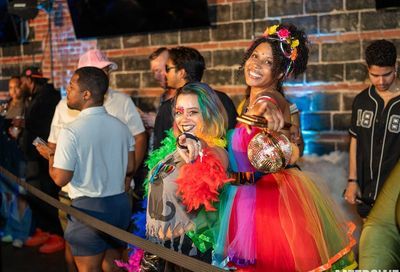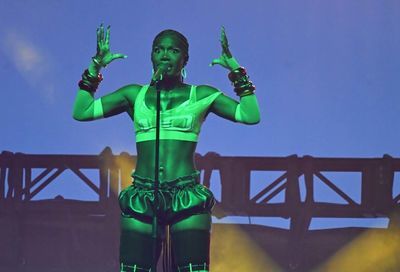Prop 8 Lawyers Olson and Boies Make Their Case — in D.C.
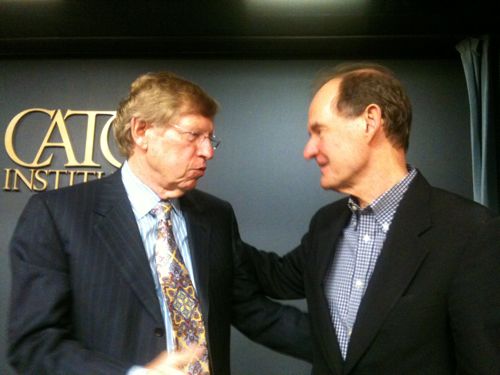
[Photo: Attorneys Ted Olson, left, and David Boies — who are co-counsel in the lawsuit challenging Proposition 8 — talk after a lunch forum at the Cato Institute on Wednesday, May 18. (Photo by Chris Geidner.)]
Although the federal lawsuit claiming that California’s Proposition 8 is unconstitutional was filed nearly two years ago and won’t find its way to the Supreme Court for quite some time if at all, former Solicitor General Ted Olson, who served in the George W. Bush administration, and liberal attorney David Boies made the rounds discussing the case that they are leading in the District on Wednesday.
This morning, the duo spoke to a group of reporters at the left-leaning Center for American Progress about the case — on appeal at the U.S. Court of Appeals for the Ninth Circuit — with a focus on the standing issue that has the case stalled currently as the California Supreme Court considers a question sent to it by the appellate court. A few hours later, Olson and Boies made their way down the street and across the political spectrum to the libertarian Cato Institute for a lunch program about the lawsuit, now named Perry v. Brown because the governor is the lead defendant named in the case.
In both instances, they were joined by the heads of those two organizations, CAP’s John Podesta and Cato’s Robert Levy. The men serve as the co-chairs of the advisory board of the American Foundation for Equal Rights, the head of which — Chad Griffin — recruited Olson and Boies to bring the case two years ago. Podesta and Levy serve as a second-level example of the non-partisan support for marriage equality that Olson and Boies often talk about as one of the benefits of having the “odd couple” of Bush v. Gore — a line Olson said he’s heard “a thousand times” — teaming up for Perry.
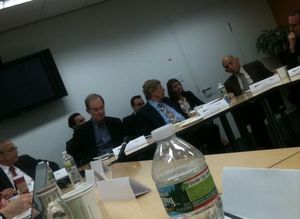 Responding to a question from Metro Weekly at CAP this morning, Boies discussed how he believes a decision that the Proposition 8 proponents lack standing to pursue an appeal of U.S. District Court Judge Vaughn Walker’s decision striking down the amendment as unconstitutional in Perry is not troubling.
Responding to a question from Metro Weekly at CAP this morning, Boies discussed how he believes a decision that the Proposition 8 proponents lack standing to pursue an appeal of U.S. District Court Judge Vaughn Walker’s decision striking down the amendment as unconstitutional in Perry is not troubling.
Contrasting it with a case in which no party is able to appeal a court’s decision, Boies said, “Here, you had lots of people with standing. All of the people that California has entrusted with enforcing the laws — not just the attorney general and governor — we had the state registrar involved, we had the two county clerks where our plaintiffs resided, the opponents went to county clerks all over the state.
“This was not something in which somebody just slipped by, and you’ve got the wrong parties here and so you’re not getting to appeal because you have the wrong parties. This is a situation in which none of the people in California with custody of enforcing the laws were prepared to do the appeal.”
As to whether a legal decision ending the case on standing grounds might create political difficulties for marriage equality advocates and supporters, Boies said he didn’t see such a decision having much impact.
“I don’t think anyone who favors marriage equality will be unhappy with it. I think that people who oppose marriage equality intensely will be unhappy — but then, they’ll be unhappy with a decision that comes out that way, no matter what,” he said. “I don’t think the average person — who doesn’t have a particular view one way or the other — will care about it, in the sense that they will know that this issue is going to continue to be litigated in other states.”
More specifically, Griffin said that AFER would bring another case in another jurisdiction if Perry doesn’t go to the U.S. Supreme Court — and later told Metro Weekly that both Boies and Olson and their respective firms — Boies, Schiller & Flexner LLP and Gibson Dunn Crutcher — would be involved any such challenge.
Boies also addressed the issue of whether or not Charles Cooper, the lawyer for the proponents who was seen by some observers to have stumbled in his presentation of the case and the appellate arguments before the Ninth Circuit in December 2010.
“The fact of the matter is, the defendants in this case had as good of legal counsel as you can get. The problem with the case was not their counsel; the problem was the case.”
Of the case that was put on — by both sides — and the ongoing efforts of the proponents to keep the video of the trial from being released publicly, Olson said, “If you had been there during this trial and if America had been there during this trial, attitudes would change overnight. As it is, attitudes are changing remarkably in this country in the last two years since this case was filed.
“The judge ordered that the trial be videotaped,” Olson noted, describing, however, how the U.S. Supreme Court stepped in at the last minute to keep the broadcast from being streamed to other federal courthouses during the trial.
“Fortunately, there is an opportunity that still exists for the American people to see that trial,” he explained, noting that a matter pending before the trial court involves whether the tape could be released and adding, “The proponents of Proposition 8 … desperately do not want that videotape out and available to the American people.”
During the question-and-answer period of the lunch event at Cato, the lawyers were asked about the motion filed by the proponents to vacate the decision of the trial court because of the fact that Judge Walker told a group of reporters that he is gay and is in a long-term relationship.
Olson characterized the filing, which will be considered by U.S. District Court Judge James Ware on June 13, dismissively, saying, “They have raised the question that because of the judge’s sexual orientation, the decision that he made almost a year ago should be vacated, and we should start over. In the first place, that is not timely. … You cannot know certain facts about the judge’s orientation and not raise a question about it, state in fact affirmatively in various different fora that that issue is not going to be raised and so forth, and then wait until you lose and then decide, ‘Oh, wait a minute. Maybe we don’t like the judge’s sexual orientation.
“Number two, on the merits, there are lots of cases and there’s a lot of history here — we don’t, constitutionally, allow someone to keep a person off a jury because of their race or because of their sex. We wouldn’t tolerate a motion to disqualify Justice Thurgood Marshall, when he was on the Supreme Court, to engage in decisions involving race. Or Justice Ginsburg, cases involving gender.
“I don’t like to predict the outcome of motions, but I’d rather be on this side of that motion,” he said to laughter, adding — with an edge, “They’re lucky that we didn’t ask for sanctions.”
Despite complex questions about standing and whether the appeal will go forward and ongoing issues about the videotape’s availability and the judge’s sexual orientation, the summary of the two lawyers’ argument — as Olson told the reporters this morning — is rather straightforward: “At the end of the day, the word ‘marriage’ means something. It isn’t just the institution of marriage, it is the words themselves.”
[Photo, above right: Center for American Progress’s John Podesta, attorneys David Boies and Ted Olson, Cato Institute’s Robert Levy and American Foundation for Equal Rights’s Chad Griffin discuss the Perry case with reporters at CAP on Wednesday morning. (Photo by Chris Geidner.)
Photo, below: Olson, center, and Boies, right, answer questions by audience members selected by David Boaz, Cato’s executive vice president, on Wednesday, May 18. (Photo by Chris Geidner.)]
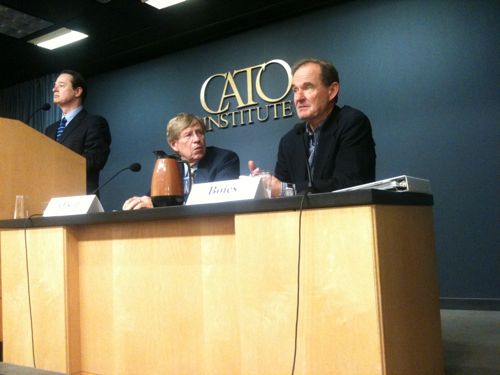
Support Metro Weekly’s Journalism
These are challenging times for news organizations. And yet it’s crucial we stay active and provide vital resources and information to both our local readers and the world. So won’t you please take a moment and consider supporting Metro Weekly with a membership? For as little as $5 a month, you can help ensure Metro Weekly magazine and MetroWeekly.com remain free, viable resources as we provide the best, most diverse, culturally-resonant LGBTQ coverage in both the D.C. region and around the world. Memberships come with exclusive perks and discounts, your own personal digital delivery of each week’s magazine (and an archive), access to our Member's Lounge when it launches this fall, and exclusive members-only items like Metro Weekly Membership Mugs and Tote Bags! Check out all our membership levels here and please join us today!




















